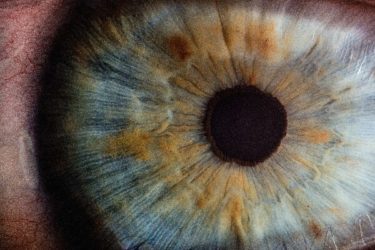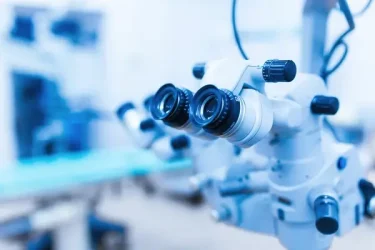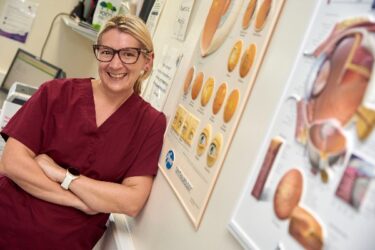To mark National Eye Health Week in the UK, we’ve decided to take a look at how you can look after your eyes through nutrition. Join us as we explore the best foods for eye health.
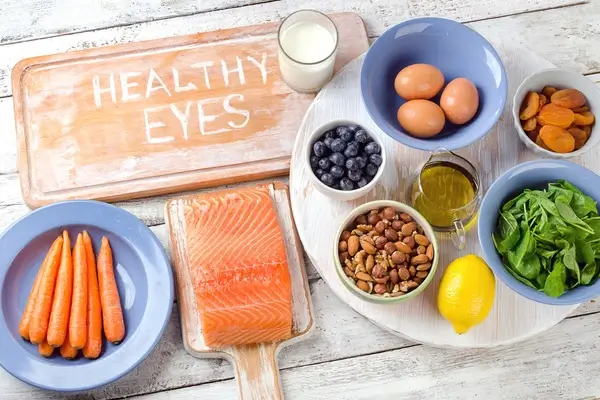
Why is good nutrition important for eye health?
The importance of a healthy diet cannot be understated for a variety of reasons. The most important of all for this article concerns eye health. Various reports strongly show positive links to certain vitamins and healthy eyes. For example, Vitamins C and E along with zinc can help reduce the risk of specific eye problems.
Can nutrition protect against eye conditions?
In a word: yes. Eating certain types of food can help you reduce the risk of eye diseases. For example, leafy green vegetables contain high doses of lutein and zeaxanthin. These have been proven to reduce the risk of cataracts and other chronic eye conditions.
What are the best vitamins for eye health and vision?
While all vitamins are good for your general health, vitamins C and E are specifically beneficial for your eyes. Vitamin C lowers the risk of developing cataracts (and therefore, the need for cataract surgery) and age-related macular degeneration (AMD). Vitamin E is known for protecting the cells in the eyes from unstable molecules that can damage tissue.
Top foods good for eye health
So, we know that certain vitamins and food types improve your eyesight. But how can you get all this nutritional goodness into your diet? What exactly do you need to be eating to enjoy the benefits? In the next section, we take a look.
Food group/type
As we’re about to see, different food groups play different roles when it comes to eye health. The food groups we’re going to look at are all proven examples of this. For example, Omega-3 is a known nutrient integral to eye development in children while vitamin A is crucial to low-light vision.
Best foods to improve eyesight
The following foods contain vitamins scientifically proven to improve your eyesight.
Vitamin A
Vitamin A plays a pivotal role in eye health. It’s an essential nutrient that aids the production of Rhodopsin, which is a protein that allows people to see in low light.
Foods high in vitamin A include:
- carrots
- pumpkins
- milk
- liver
- eggs.
Vitamin C
The antioxidant properties of vitamin C are believed to be responsible for its ability to slow the progression of cataract development. This vitamin has also been proven to slow the progression of macular degeneration.
The following foods all contain vitamin C:
- cauliflower
- cabbage
- lemon
- oranges.
Vitamin E
A powerful antioxidant that slows the progression of a macular degeneration.
Foods containing vitamin E include:
- almonds
- sunflower seeds
- peanuts.
Lutein/Zeaxanthin
These are among the best vitamins to aid eyesight. Foods containing Lutein or Zeaxanthin have been proven to slow the progression of macular degeneration and cataracts. These can be crucial as they act as a natural sunblock by absorbing excess light energy. They’re also thought to protect your eyes from harmful blue lights found in digital displays (e.g. computer screens).
Foods containing lutein and zeaxanthin include:
- broccoli
- corn
- kale
- egg yolk.
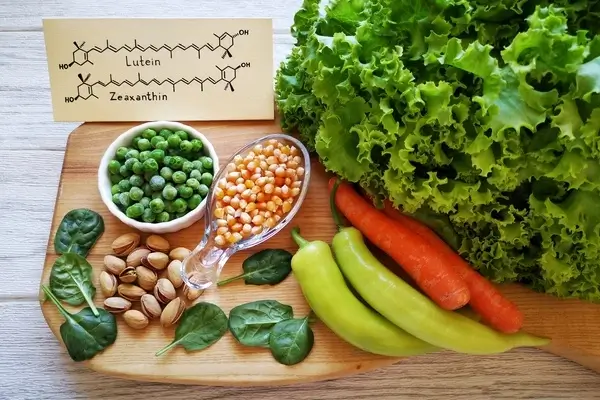
Omega-3
Naturally occuring fatty acids like Omega-3 are extremely beneficial for eye health. These are mainly found in fish such as tuna, salmon, and cod liver oil.
Best foods for retina health
The best foods to eat to help ensure good retina health include the following:
- leafy green vegetables
- eggs
- citrus fruits
- nuts (specifically almonds and peanuts)
- sweet potatoes
- whole grains
- avocado
- berries
- tomatoes
- carrots
- fish (the more oily, the better!).
How often should I eat these foods?
You should try to eat these foods as often as you can but we know that it’s almost impossible (let alone a bit dull!) to only eat a perfect, healthy diet. Which is why it’s important to focus on striking a balance. Including cheat days and allowing yourself treats every now and again will help keep you motivated to include all the good stuff in your diet.
Taking eye health supplements
Regularly taking eye health supplements is a scientifically proven way of boosting eye health. For example, taking Omega-3 supplements could benefit people with dry eye disease. In fact, a recent study conducted on individuals with dry eyes revealed that taking Omega-3 supplements every day for three months resulted in a significant reduction in dry eye symptoms.
Looking after your eye health – tips
Other tips on keeping your eyes shipshape include:
- working in proper lighting to avoid excessive eye strain
- wearing sunglasses on bright, sunny days
- blinking frequently
- attending regular eye health checks
- adjusting your vision to near and far objects if working for long periods in front of a screen
- quitting smoking (if already in the habit).
Following these tips, along with maintaining a healthy, balanced diet will help ensure your eyesight remains in top condition.


